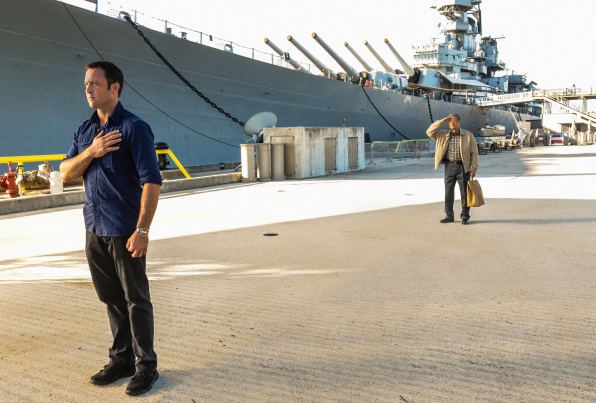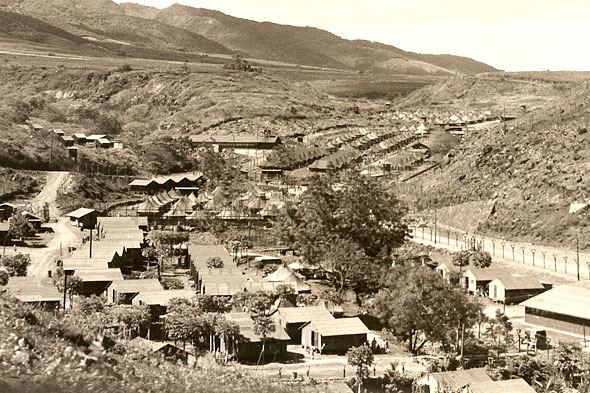I can’t figure out why lists of positive, progressive representations of Asian Americans on primetime television keep forgetting Hawaii Five-O. Really.
When we think about Asian Americans on television, we will rattle off several of the usual suspects — The Mindy Project, Community, Lucy Liu on Elementary, Ming Na Wen on Agents of S.H.I.E.L.D., Glenn on The Walking Dead. But then there’s bizarre pop culture blind spot for Hawaii Five-O, a show that features three (count ’em three) regular Asian American cast members: Daniel Dae Kim as Chin Ho Kelly; Grace Park as Kono; and Masi Oka as Dr. Max Bergman. It also gives a home to a breath-taking rotation of Asian American guest stars, including Brian Yang in the recurring role of Charlie Fong.
(Funny story: I was at an exhibit opening for Secret Identities’ Marvels and Monsters, and was introduced to Yang — there to promote Linsanity — by photographer Corky Lee. Lee said to me, “do you recognize this guy? He’s famous!” I stared at them both blankly and said, “err, no.” “Really,” asked Yang. “I’m on Hawaii Five-O!” “You are? Huh.” “Do you watch it? Don’t you recognize me?” “Yeah, I do watch the show. But…. huh, no, I’m sorry, I don’t recognize you at all.”
Ooops. This is why I’m terrible at networking. I’m sorry, Brian Yang! )
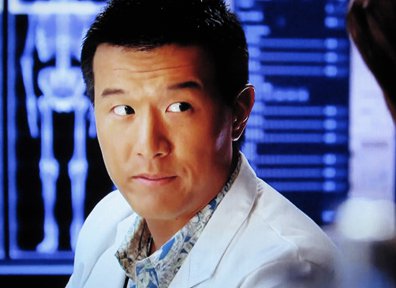
Sure, Hawaii Five-O will never be mistaken for a fabulous crime procedural. It’s formulaic and campy, and an unabashed vehicle for gratuitous bikini shots and/or Alex O’Loughlin’s abs. And, sure, the two main characters — McGarrett and Danno — are about as White as the driven snow.
But, against this backdrop, Hawaii Five-O also is quietly doing some amazing things for the Asian American community.
One of the most ground-breaking events was last week’s episode commemorating the attack on Pearl Harbour. And, strangely, it aired with virtually no fanfare from the APIA community.
I’ve always had a difficult time navigating my own emotions to the annual anniversary of Pearl Harbour. Prior to 9/11, Pearl Harbour marked the most devastating recent attack on US soil, and ushered in years of global war for America. More than 2000 Americans lost their lives that day; and it is a day of quiet reflection and appreciation for their service and sacrifice. Hawaii Five-O adeptly renders the terrified emotions of that day for most Americans in their opening scene, which captures the attack from the perspective of officers stationed at a military base.
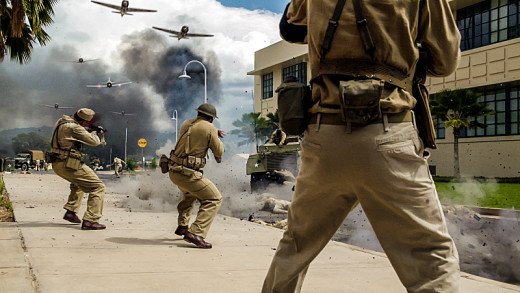
But, December 7th — a day that indeed lives on in infamy — also brings to mind the events (and atrocities) of World War II, including those committed by the United States, in part in response to the Pearl Harbour attack. This date reminds us of the anti-Japanese fear and xenophobia whipped up domestically in the months following the attack. This date reminds us of the indefensible decision by the US government to arrest, relocate and intern its own citizens in makeshift prison camps for the crime of their race. This date recalls this country’s eventual decision to detonate two atomic bombs over a civilian city, killing thousands.
Last week’s episode of Hawaii Five-O gamely decided to tackle this juxtaposition in their Pearl Habour episode: a courageous decision that alone deserves commendation. The episode, titled “Ho’onani Makukane (Honor Thy Father)” was the first time to my (admittedly limited) knowledge that Japanese American internment received primetime televised attention of this sort.
In execution, the episode is somewhat hit-or-miss. It’s generally what you would expect when a weighty topic like this finds itself aired on a mainstream network like CBS. In brief, the Five-O team must solve the decades old murder of David Toriyama’s father, whose family was interned at one of Hawaii’s five internment camps of the time. David (played by James Saito), now a 70 year old man, wants to avenge his father’s murder and recover the samurai sword that was stolen from him. He blames a 90-year-old survivor of Pearl Harbour who later served as a guard at the internment camp the Toriyama family was interned at.
There are plenty of cringe-inducing moments in the episode. The worst offender is when the Pearl Harbour survivor uses the slur “Jap” but then reveals his biracially Japanese American daughter as proof he’s not racist. But, much of the script is ham-fisted: the Toriyama family’s over-the-top “Leave It To Beaver” depiction prior to Executive Order 9066, and the elder Toriyama’s inexplicable stoicism and adherence to family honor, leave much to be desired. It’s all a tad obvious; like I said, what you would expect from primetime network television wading into the realm of identity politics.
But this all aside, this episode gets a clear “A” for effort. The show’s production team apparently wanted to write an episode on this subject since the show’s infancy, citing the inattention that Japanese American internment gets in media and in history class:
[Executive Producer Peter] Lenkov, who was on set to greet Hayashino and Kurahara, wanted to include the internment experience ever since reading about it while researching Hawaii history before writing the series pilot.
“Why not?” he said. “It’s a powerful story. And honestly, it’s a story most people don’t know about.”
[…]
Director Larry Teng, who regularly helms “Five-0? episodes, was floored when he first read the script. He said it was the most important story in his five years directing TV episodes.
And a huge responsibility as well.
“This show has never fallen short of going after a big spectacle,” Teng said during a break. “But here it’s different. It’s not an explosion. It’s not an action sequence. This is cultural and social history that we’re portraying. And we went to really great lengths to pay attention to details.”
The vast majority of the episode reads like a whirlwind tour of relevant Wikipedia articles — Pearl Harbour, internment, the 442nd infantry. All are explained in rather pedantic detail to an audience the writers assume have never heard of these things before, and the sad truth is that this assumption is probably a good one. The relative inattention internment gets in public education and mainstream media means that there’s a good chance that most viewers of Hawaii Five-O have only a cursory knowledge of internment, if that. They might not have been aware that there were camps in Hawaii, or may have viewed through rosy White-washing of the realities of life in the camps (thanks, Michelle Malkin!). In that context, one forgives the crime scene procedural meets Asian American History 101 treatment that Hawaii Five-O offers to the subject matter.
And, there are some things this episode gets really, really right. David Toriyama’s character, for example, is referred to throughout as David, and great pains are made to emphasize his — and his family’s — American-ness.
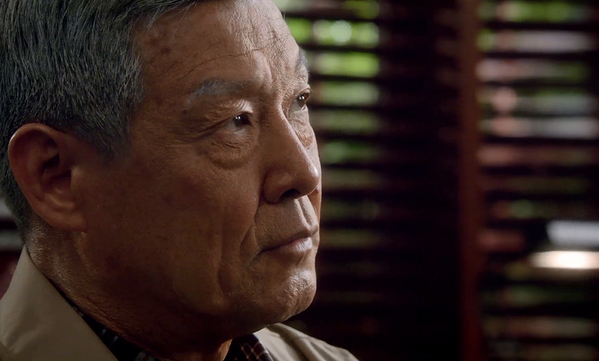
As a child, David speaks without a hint of an accent (nor should he have one; he is native-born) and is a baseball fanatic; later, he is described as a veteran of the Korean War. Again, it’s all a bit of overkill to establish David as sympathetic and “just like one of us”. But, it’s still a refreshing challenge to the Perpetual Foreigner stereotype Asian Americans continue to grapple with on a day-to-day basis, and which is particularly relevant when it comes to the political landscape of the era.
Second, Daniel Dae Kim’s presence — and the subtle use of Chin Ho Kelly in the story –lends a quiet, serious authenticity to the subject matter. Kim is no stranger to using his Hollywood fame to advance the Asian American cause, and notes that he had reservations about how the show would treat the subject matter. It’s a subject he’s familiar with: he helped produce a production of “Hold These Truths“, a stage play that explores the history of internment.
For this episode, Kim took to the media to state the case for telling the story of Japanese American internment (emphasis is mine):
“I think that not many people know about our country’s past, and I think it’s really important that these stories don’t die,” star Daniel Dae Kim tells TVGuide.com. It’s nice when television can entertain and educate at the same time. I feel like it’s a pretty unique opportunity to go beyond the crime of the week and delve into a chapter in our nation’s history.”
In a scene — one of the strongest of the episode — Kim’s Chin Ho Kelly approaches David Toriyama, at a point when the latter is still suspected of attempted murder. In an episode that had just finished overtly thanking Pearl Harbour survivors and other veterans for their service, Chin Ho Kelly quietly asks to shake David Toriyama’s hand. Why? For his service. For his sacrifice. To apologize for the treatment of him and his family during internment. David, confused, asks Kelly his name. Kelly responds, saying he’s Korean with a little bit of Japanese in the mix (presumably Kono’s side of the family). David then takes his hand in a quiet, firm handshake. It’s not just an acceptance of thanks, but a moment of Asian American brotherhood, kinship, shared inter-ethnic history and struggle. A powerful Asian American moment.
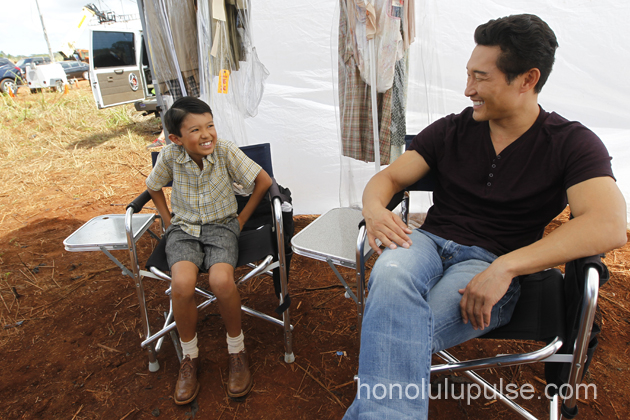
The episode’s most memorable moment is the real-life recreation of an actual internment camp — outdoor bunks, sweltering heat, barbed wire, armed guards, machine guns pointed inward. Even for someone who has toured a recreation of internment camp life, it was a powerful visual to see an internment camp, rendered in colour as if one could reach out and touch the splintered wood and sharp wire. This episode succeeded in making the internment camp real for the viewer.
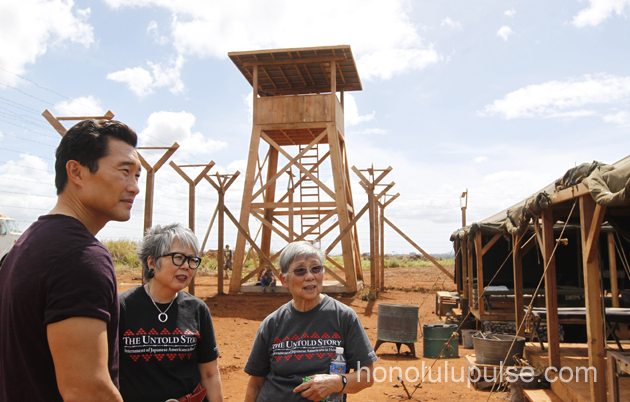
Ultimately, this episode was remarkable for its lofty and politically progressive ambition. I won’t pretend that it worked at every moment in its execution, but I’ll admit I also forgive it for those weaknesses. Because, really, can you believe what they tried to do here?
Frankly, if having more Asian Americans like Daniel Dae Kim in Hollywood results in primetime television being used as an education tool to fill in the gaps left open by high school history classes, than I am all for it. If Hawaii Five-O is willing to risk its own middle American audience to delve into the tricky, sensitive subject of Japanese-American internment — and to emerge at the other side having provided a fair, balanced, educational, and emotional episode on the subject — than this is media we need to be supporting. Fighting for more Asian American faces isn’t enough; I daresay episodes like “Ho’onani Makukane” has taken it a step farther, and placed real-life Asian American history on TV.
httpv://www.youtube.com/watch?v=gOElQp_GDV8
Hawaii Five-O has definitely elevated itself to one of the most landmark Asian American shows on television right now. Kudos to the entire production team that was responsible for this episode, and for keeping this show on the air for four seasons so far.
Also, as if I didn’t already have enough love for Daniel Dae Kim. This man is incredible. As my Brian Yang encounter attests, I’m not someone who gets easily star-struck; I think I might just have a heart attack if I could have just one minute to shake Daniel Dae Kim’s hand and thank him for what he is quietly doing for our community.
